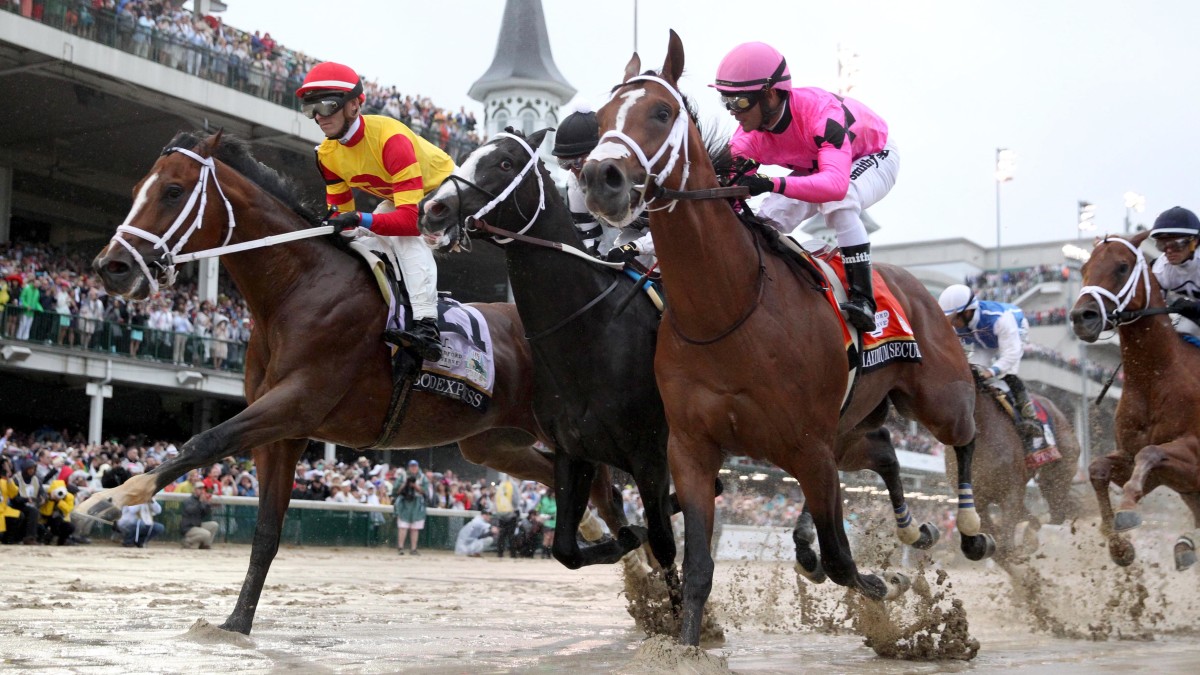Horse Racing Sees Another Day of Reckoning Amid Doping Scandal
LOUISVILLE, Ky. — When thoroughbred trainer Jason Servis arrived here last spring for the Kentucky Derby with undefeated colt Maximum Security, the whispers trailed after him.
Servis was juicing his horses, racetrack veterans said. Medication was inflating his winning percentage to a preposterous level. His horses may have been passing drug tests, but his rise up the racing ranks didn’t pass the smell test.
Maximum Security’s unusual career arc fit the gossip.
Servis did not race him until December 2018, and his first competition was a $16,000 maiden claiming race—which means anyone could have put in a claim beforehand to buy the horse for a bargain price. No rational trainer who thinks he has a Kentucky Derby–level two-year-old would enter a horse in a cheap claiming race. Whenever Servis was asked about it, he got defensive.
“It’s not like I … waved a magic wand on him and won a stake,” Servis told David Grening of the Daily Racing Form.
After news from the FBI and U.S. Attorneys Office Monday, what a sentence. A magic wand apparently can look a lot like a syringe used for administering performance-enhancing drugs, it seems.
Maximum Security went on to finish first in the Kentucky Derby, only to be disqualified for interfering with other horses. It was the correct ruling by racing stewards, but it was also pretty clear that Servis had the best horse that day—and many days since, winning stakes races in July, October and December. On Feb. 29, Maximum Security won the Saudi Cup and took home the biggest winning purse in history, a whopping $10 million.
The Saudis might want their money back.
Servis was indicted by the feds Monday for allegedly doping his horses. He and trainer Jorge Navarro are charged in “four conspiracies to manufacture, distribute, and administer adulterated or misbranded drugs.” Servis was one of 27 people charged in four unsealed indictments, alleging “the shipment and administration of … drugs designed to secretly and dangerously enhance the racing performance of horses beyond their natural ability, a dishonest practice that places the lives of affected animals at risk.”

Related specifically to Servis, the indictment says he “doped virtually all horses under his control, including Maximum Security.” The horse’s name takes on an ironic tinge today, with his trainer facing a potential five years in prison if found guilty.
This is yet another day of reckoning for the reeling sport of horse racing, a rudderless anachronism that keeps hastening its own demise. The dominant headlines of 2019 pertained to the spate of on-track horse deaths, most notably in Southern California. Now 2020 has a full-blown doping scandal that involves the best active American horse and his trainer.
Abusing and killing beautiful animals isn’t something the sporting public willingly signs up for. At some point what passes for the leadership of this balkanized sport may actually confront the damage done to its credibility and make drastic changes in terms of allowable medications and racetrack safety. If not now, there may not be much of a future worth trying to salvage.
The details here are repugnant: track vets conspiring with trainers to crank up horses on all manner of PEDs; horse deaths covered up; a cynical acceptance of cheating and animal abuse as a byproduct of doing business.
The feds’ release includes this intercepted text message from indicted trainer Nicholas Surick, referring to Navarro: “You know how many [expletive] horses he [expletive] killed and broke down that I made disappear? You know how much trouble he could get in … if they found out … the six horses we killed?”
The striking thing about this Southern District of New York sports corruption bombshell is how similar it seems to its last one, the college basketball scandal that blew open in 2017. Many of the law-enforcement names are the same, and the aura of the scandal is, too.
In both cases, as in other sports, sudden success stories often are too good to be true. Coaches and trainers who come out of relatively nowhere rarely outsmart or outwork everyone else. They cheat.
In college basketball, the black market for players had become so pervasive that it was an open secret. In horse racing, the alleged drug cheats had avoided detection and/or major sanctions long enough that they, too, operated with impunity. The suspicions were all there in horse racing, but from the lax leadership to the cheerleading media to the competitors who won’t point fingers, not much was done.
And in both scandals, the federal indictments by no means expose everyone cheating within the sport. In the basketball prosecution, the feds bragged about pulling back the curtain on corruption but then played a hyper-conservative game, with limited charges and a burial of mountains of evidence. We’ll see if the horse racing prosecution plays out similarly.
But at least some of the alleged cheaters have been dragged out into the light, which is a good thing. In regards to Jason Servis, this is a comeuppance more than a decade in the making.
In 2009, renowned Washington Post turf writer Andrew Beyer rather pointedly listed Servis among a group of “miracle workers” who were defying the realistic norms of racing.
In subsequent years he was among dozens of racetrackers who had horses test positive in Florida for excessive medication, but never face sanctions due to shoddy testing protocol.
After some big scores in 2018 with his first Kentucky Derby entrant, Firenze Fire, Servis was catching flak from those who labeled his work too good to be true. “People are talking a lot of s---,” Servis told HorseRacingNation.com, “and I’m really not happy about it.”
On Monday, the feds were the ones "talking s---"—and backing it up with damning evidence. Jason Servis probably still isn’t happy about it, but his lawyers might advise him to shut up and take it.
